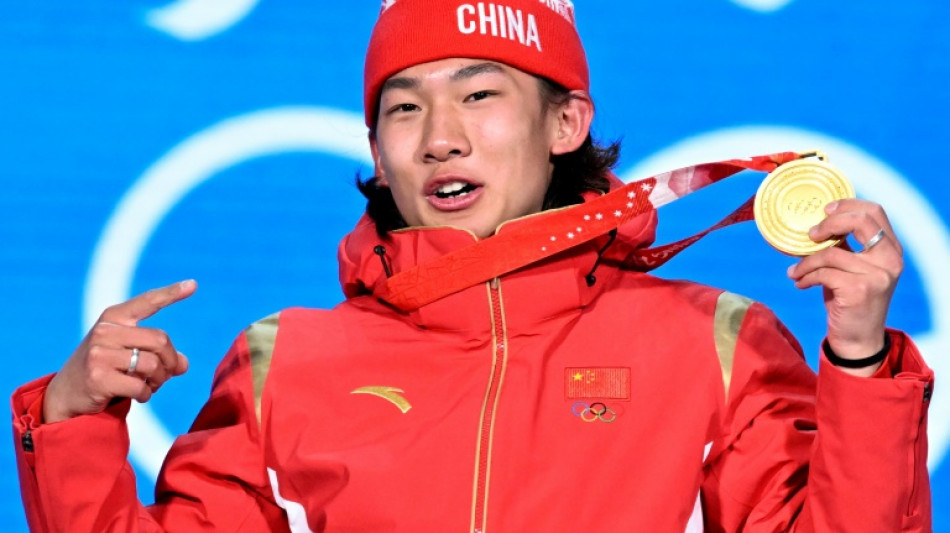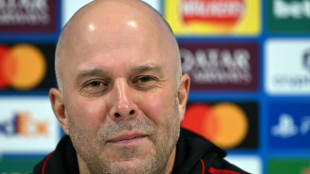
-
 Japan PM's tax giveaway roils markets and worries voters
Japan PM's tax giveaway roils markets and worries voters
-
Amid Ukraine war fallout, fearful Chechen women seek escape route

-
 Rybakina surges into Melbourne semis as Djokovic takes centre stage
Rybakina surges into Melbourne semis as Djokovic takes centre stage
-
Dollar struggles to recover from losses after Trump comments

-
 Greenland blues to Delhi red carpet: EU finds solace in India
Greenland blues to Delhi red carpet: EU finds solace in India
-
Will the EU ban social media for children in 2026?

-
 Netherlands faces 'test case' climate verdict over Caribbean island
Netherlands faces 'test case' climate verdict over Caribbean island
-
Rybakina stuns Swiatek to reach Australian Open semi-finals

-
 US ouster of Maduro nightmare scenario for Kim: N. Korean ex-diplomat
US ouster of Maduro nightmare scenario for Kim: N. Korean ex-diplomat
-
Svitolina credits mental health break for reaching Melbourne semis

-
 Japan's Olympic ice icons inspire new skating generation
Japan's Olympic ice icons inspire new skating generation
-
Safe nowhere: massacre at Mexico football field sows despair

-
 North Korea to soon unveil 'next-stage' nuclear plans, Kim says
North Korea to soon unveil 'next-stage' nuclear plans, Kim says
-
French ex-senator found guilty of drugging lawmaker

-
 US Fed set to pause rate cuts as it defies Trump pressure
US Fed set to pause rate cuts as it defies Trump pressure
-
Sleeping with one eye open: Venezuelans reel from US strikes

-
 Venezuela's acting president says US unfreezing sanctioned funds
Venezuela's acting president says US unfreezing sanctioned funds
-
KPop Demon Hunters star to open Women's Asian Cup

-
 Trump warns of 'bad things' if Republicans lose midterms
Trump warns of 'bad things' if Republicans lose midterms
-
Russian strikes in Ukraine kill 12, target passenger train

-
 With Maduro gone, Venezuelan opposition figure gets back to work
With Maduro gone, Venezuelan opposition figure gets back to work
-
Celebrities call for action against US immigration raids

-
 Rubio to warn Venezuela leader of Maduro's fate if defiant
Rubio to warn Venezuela leader of Maduro's fate if defiant
-
Denver QB Nix 'predisposed' to ankle injury says coach

-
 Lula, Macron push for stronger UN to face Trump 'Board of Peace'
Lula, Macron push for stronger UN to face Trump 'Board of Peace'
-
Prass stunner helps Hoffenheim go third, Leipzig held at Pauli

-
 Swiss Meillard wins final giant slalom before Olympics
Swiss Meillard wins final giant slalom before Olympics
-
CERN chief upbeat on funding for new particle collider

-
 Trump warns US to end support for Iraq if Maliki returns
Trump warns US to end support for Iraq if Maliki returns
-
Judge reopens sexual assault case against goth rocker Marilyn Manson

-
 South Korea's ex-first lady to learn verdict in corruption case
South Korea's ex-first lady to learn verdict in corruption case
-
Rosenior dismisses Chelsea exit for 'untouchable' Palmer

-
 Markram powers South Africa to win over West Indies
Markram powers South Africa to win over West Indies
-
Vladimir Padrino: Venezuela's military power broker

-
 Amazon closing Fresh and Go stores in Whole Foods push
Amazon closing Fresh and Go stores in Whole Foods push
-
Koepka nervous about game and fans in PGA Tour return

-
 Trump's Iowa trip on economy overshadowed by immigration row
Trump's Iowa trip on economy overshadowed by immigration row
-
Dortmund coach says Inter Milan are improved under Chivu

-
 US border chief in Minneapolis as Trump tries to calm crisis
US border chief in Minneapolis as Trump tries to calm crisis
-
What to know about America's colossal winter storm

-
 Iran warns against 'instability' after US strike group arrives
Iran warns against 'instability' after US strike group arrives
-
GM reports quarterly loss but boosts shareholder returns

-
 US banks fight crypto's push into Main Street
US banks fight crypto's push into Main Street
-
NFL Bills make offensive coordinator Brady new head coach

-
 TikTok settles hours before landmark social media addiction trial
TikTok settles hours before landmark social media addiction trial
-
Newcastle braced for 'ultimate test' against PSG after storm disruption

-
 Brook blitz ends Sri Lanka's unbeaten home run, England clinch series
Brook blitz ends Sri Lanka's unbeaten home run, England clinch series
-
LVMH 2025 net profit drops 13% to 10.9 bn euros

-
 Philip Glass pulls Kennedy Center premiere after Trump takeover
Philip Glass pulls Kennedy Center premiere after Trump takeover
-
Slot says Liverpool must fix 'very bad cocktail'


Olympic snowboard king Su Yiming showcases a more confident China
Sporting shoulder-length hair, rings and baggy trousers, teenage snowboarding sensation Su Yiming looked every inch the cool, confident ambassador of China's new youth as he swept to home Olympic gold.
The former child actor is one of the breakout stars of the Beijing Olympics having won silver and then on Tuesday gold, catapulting the 17-year-old to stardom and amassing him an avid social media fanbase at home.
Su heralds the rise of a new generation of young, patriotic Chinese athletes with the kind of aura of cool that has eluded the young Olympians who, unlike Su, are products of China's gruelling Soviet-style sports academies.
China's first men's Olympic medallist in snowboarding has earned a legion of Chinese fans through his down-to-earth demeanour, effortless style and love of music -- as well as becoming the new face of a sport that champions individualism and daredevil courage.
"Snowboarders have a particular style to them which Su fits perfectly. It's something that would definitely resonate with younger generations in China and elsewhere," said China-based sports analyst Mark Dreyer, author of "Sporting Superpower: An Insider's View on China's Quest to Be the Best".
After a scintillating run in the slopestyle last week, where he won silver, Su clasped his hands to his mouth and repeatedly screamed a profanity in English live on air.
"My worry is that at some point they're going to ask him to conform and basically be a snowboarder without (a personality)," added Dreyer.
"He could legitimately become a great soft-power ambassador for China -- but not necessarily the soft-power ambassador that China wants."
- One billion views -
Hailing from frigid northeastern China, Su first took to the slopes as a toddler. He joined the Chinese national team aged 14 after years spent balancing his passion with a fledgling acting career.
He landed his first brand deal with snowboard manufacturer Burton at age seven, although his commercial endorsements are a fraction of his fellow teenage star Eileen Gu, the Californian-born Chinese freestyle skier who has also won silver and gold.
"He's really just come into the top echelon of riders in the last four to six months," said Dreyer.
Described by his coach as mature beyond his years, the snowboarder has said in interviews that he trains "320 days a year", sometimes for six hours a day when trying to master a tricky new move.
His father says that he has an "innate passion for snowboarding".
When not training abroad, Su surfs on China's southern island of Hainan during the summer off-season.
"For him to compete and stay at the top level, he’s got to be in Europe and the United States. He's getting all those influences and becoming more of an international person," said Dreyer.
Within hours of his Big Air gold on Tuesday, the hashtag "Su Yiming gold medal" racked up more than one billion views on China's Twitter-like Weibo.
"If you have a goal, have courage to try it and give your all to it," Su told state broadcaster CCTV.
- Privilege debate -
These young, culturally confident stars -- including the 18-year-old Chinese-American Gu -- are a valuable addition to China's soft-power arsenal at a time when Beijing is keen to project cultural influence abroad and showcase domestic confidence.
The cosmopolitan lifestyles of Su and Gu have sparked social media reflection on their relative privilege compared to figures such as 14-year-old Olympic diver Quan Hongchan, who has spoken about earning competition money to support her farmer parents.
While Beijing has held a firm grip on its rigid state academy system for athletes -- prioritising sports with greater medal chances -- experts said it has slightly relinquished control in certain disciplines, particularly as it pushes winter sports.
Zheng Jinming, professor of sport management at Singapore's National Institute of Education, said this has allowed market forces to create a more organic interest in "cool" sports among younger generations of Chinese who have grown up in better economic conditions.
"But can those who are interested in these cool sports successfully access resources which can enable them to embark on, undertake quality training and progress in these sports?" asked Zheng.
Analysts also questioned whether these new sports celebrities would be able to retain authenticity as their popularity in China snowballs.
The more China wants Su to conform to their idea of a healthy role model, "the more it takes away from his appeal in the first place", said Dreyer.
F.Pavlenko--BTB

